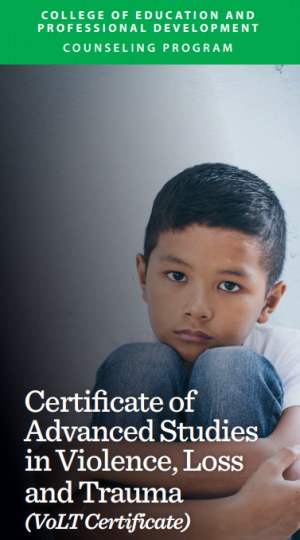Violence, Loss and Trauma (VoLT)
This unique Graduate Certificate of Study will revolutionize your understanding of violence, loss, and trauma, and will equip you with specialized skills for the treatment of trauma spectrum disorders in children and adults. By completing this certificate you will gain an understanding of trauma, complex trauma, developmental trauma, dissociation, and complex bereavement, including working with children, survivors, and perpetrators. This certificate is offered through online, distance learning coursework of 18 graduate credit hours.
Topics include:
- Trauma and trauma-spectrum disorders
- Addictions and trauma
- Complex and developmental trauma
- Grief, bereavement, and complex bereavement
- Attachment theory and attachment disorders
- Neurobiology of traumatic stress
- Domestic violence
- Military trauma
- Treatment of children, survivors, and perpetrators
- Restorative Justice in the context of trauma
- Existential aspects of suffering and resilience
- Self-regulation, grounding, treatment planning
- Vicarious trauma and practitioner self-care
The graduate VoLT Certificate offers comprehensive understanding of how violence, loss and trauma affect lives. It also prepares practitioners for creative, expressive, and experiential interventions that promote resilience, self-care, and personal responsibility for a life well-lived. The certificate not only prepares you for planning mental health treatment for others in the future, but also how to care for yourself as well.
VoLT Course Descriptions
The VoLT Certificate requires completion of COUN 555, 556, 654, and 682; and two electives from the following list, for a total of six 3-credit courses (18 credits total).
Students must pass COUN 555 with a B or higher in order to move to subsequent VoLT courses.
VoLT Frequently Asked Questions
THEN, locate your status below and follow the instructions.
- For current graduate students at Marshall University:
- If you’re a graduate student in Counseling, Psychology, Social Work, or Leadership Studies, contact your Academic Advisor and ask to Add a Second Program to your current Plan of Study. This requires a Secondary Program Request Form.
- If you’re a graduate student in a program (other than those listed immediately above) at Marshall University, contact the Counseling Program to determine whether to apply to the VoLT Certificate or add it as a Secondary Program.
- For current graduate students outside Marshall University:
- Apply for the VoLT Certificate through Graduate Admissions.
- For those who already have a Master’s degree:
- Apply for the VoLT Certificate through Graduate Admissions.
After you’ve completed your coursework, apply to receive the Certificate by completing this Graduate Certificate Program Completion Form, and submit it to the Office of the Registrar.
Contact Dr. Carol Smith and your Academic Adviser to let them both know you have finished your coursework.
Contact Us
Please contact Dr. Carol Smith for next steps.
Carol M. Smith, PhD, LPC, NCC, CCTP
Professor of Counseling
Coordinator, Violence, Loss, and Trauma Certificate
carol.smith@marshall.edu
304-746-1921
Dr. Eric Beeson, PhD, LPC, NCC, ACS, CRC
Professor of Counseling
Counseling Department Chair
beeson@marshall.edu
304-746-1966
